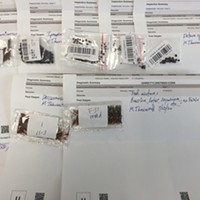[
{
"name": "Top Stories Video Pair",
"insertPoint": "7",
"component": "17087298",
"parentWrapperClass": "fdn-ads-inline-content-block",
"requiredCountToDisplay": "1"
}
]
Our country's name comes from Amerigo Vespucci, the Italian explorer who first challenged Columbus' assertion that Brazil and the West Indies were part of Asia. But how close did we come to be living instead in the United States of Zheng? Really close, according to ex-British Royal Navy Officer Gavin Menzies, author of the 2003 bestseller 1421: The Year China Discovered America. As we'll see, however, he's in a minority.
Menzies' assertion is based on the voyages of the legendary Chinese eunuch-admiral Zheng He (1371-1433), who made seven long voyages between 1405 and 1433, commanding huge fleets that included the largest wooden ships of all time. His first voyage, 1405-1407, was from China to the southwest coast of India, via present-day Vietnam, Java, Sumatra and Sri Lanka. Subsequently, he sailed as far as Aden (in Yemen) and down the east coast of Africa to Mombasa (Kenya).
These were not voyages of discovery, since they all followed long-established and well-mapped trade routes. Rather, they were designed to "show the flag" and impress on foreign rulers the symbolic authority of the Chinese Ming emperor. I'll bet they did, too. No other country in the world could field such an imposing fleet as Zheng He's, with his four-deck, nine-masted so-called "treasure ships," each the size of a football field, together with a small armada of support vessels and combined crews totaling over 25,000 men.
The voyages abruptly stopped after the death of the 62-year-old Zheng He in 1433, as he was homeward-bound from his seventh expedition. Probably a combination of court intrigues and financial constraints was to blame. Zheng He had been part of an influential eunuch faction in the emperor's court, opposed by the more conservative Confucian bureaucrats. With Zheng He dead and costly Mongol raids increasingly threatening the northern frontier, Chinese emphasis shifted to land, and most of Zheng He's records were soon destroyed by xenophobic scholars.
But ah, the what-ifs of history. If Lee Harvey Oswald had missed, would Kennedy have pulled out of Vietnam before the war escalated? If an unusually fierce storm hadn't wrecked 60 ships of the Spanish Armada in 1588, would Spain have dominated all Europe? And if Zheng He had sailed east across the Pacific, would you be reading this column in Chinese logograms (all 7,000 of them)?
That's where Gavin Menzies comes in. In his re-writing of history, Zheng He's fleet not only "discovered" what we call America, but it circumnavigated the globe, one-upping Columbus, Vespucci, Magellan and all those European Johnny-come-latelys. In 550 pages, Menzies cites a host of dubious sources, including, for instance a pre-Columbian Chinese map showing Australia ("unfortunately ... lost") and Chinese anchors found off the coast of California (absent documentation). He contradicts himself (claiming, for example, that 15th century sea levels were both higher and lower than now) and does pretty much everything to raise the hackles of professional historians (his forte).
As far as I know, no reputable researcher has signed on to Menzies' theories. Still, he has sold a million copies of 1421 (three of which are in the Humboldt County Library), and his latest book — on Atlantis (of course!) isn't doing badly either.
Me, I'll stick to evidence-based history. Unless, of course, one of those six-figure advances comes my way ...
Barry Evans' ([email protected]) upcoming bestseller will prove that Zheng He was actually a castaway Welsh
coal-miner from the Rhondda Valley.
Speaking of China, ships
Comments
Showing 1-1 of 1
more from the author
-
A Brief History of Dildos
- Apr 11, 2024
-
Eclipse!
- Mar 28, 2024
-
The Little Drone that Could
- Mar 14, 2024
- More »
Latest in Field Notes
Readers also liked…
-
Trouble on the Line: The Reality Part 2
- Nov 3, 2022




































